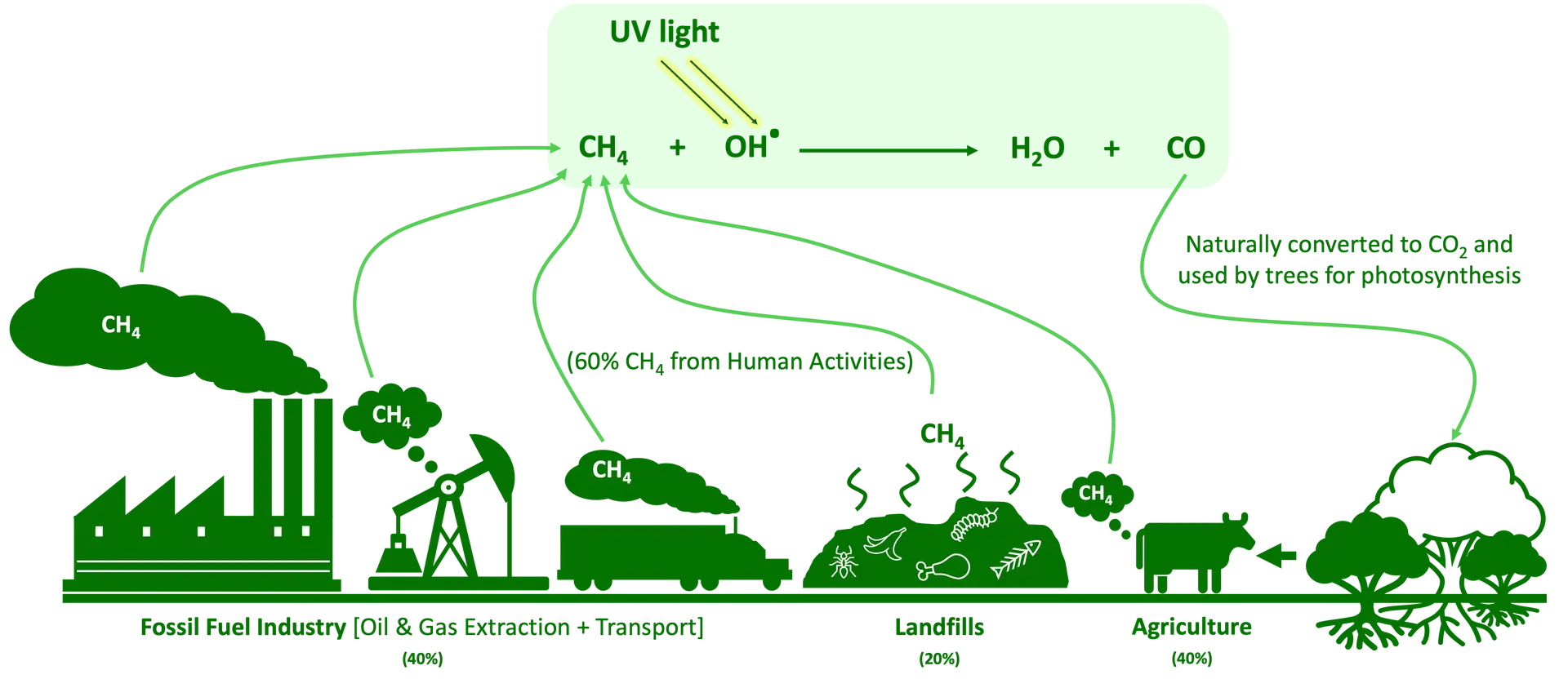WHY IT MATTERS
Tackling Methane: A Climate Imperative
Innovative Solutions for Immediate Impact
The Immediate Impact of Innovative Technologies
Fossil fuels have been the backbone of global development, enabling advancements in transportation, energy, and technology. Their high energy density and ease of use have made them indispensable. However, the environmental cost of their use is undeniable, and finding alternatives that match their scale and utility remains a challenge.
Renewable energy sources, such as solar and wind, require extensive land use to meet global demand. Hydrogen and ammonia are emerging as potential zero-carbon fuels but come with significant challenges. Hydrogen produces NOX emissions, and ammonia-powered engines emit N₂O, a greenhouse gas 298 times more potent than CO₂. Additionally, ammonia is toxic and requires complex storage solutions.
Most zero-carbon fuels today are derived from fossil fuels, and truly zero-carbon alternatives represent only a small but growing share of the market. Studies indicate that even with an immediate transition to zero-carbon infrastructure, achieving the Paris Agreement’s 1.5°C target is unlikely due to the volume of existing emissions. Addressing the current infrastructure is critical—this is where Daphne Technology delivers value.
Methane’s Role in Global Warming
Methane (CH₄) is a critical driver of climate change, second only to carbon dioxide. Its warming potential is more than 25 times that of CO₂ over a century, and atmospheric concentrations have more than doubled since preindustrial times. Over half of global methane emissions are linked to human activities in fossil fuels, agriculture, and waste management.
Methane has a shorter atmospheric lifespan – around 12 years – than CO₂. This means reducing methane emissions today can yield significant climate benefits within decades. Naturally, methane is broken down by sunlight and hydroxyl radicals, but this process is slow and insufficient to counter current emission levels.

Image: Illustration of the natural methane cycle process.
Why Methane Abatement Matters
The need to reduce methane emissions is urgent. As a short-lived climate pollutant (SLCP), methane remains in the atmosphere for a shorter period than CO₂ but has a much greater warming effect. SlipPure™’s plasma-catalytic technology is a breakthrough solution for industries aiming to reduce their emissions footprint.
- Immediate Climate Impact: Methane contributes to rapid global warming. Reducing emissions can quickly slow the rise in global temperatures and improve air quality by lowering ground-level ozone formation.
- Alignment with Climate Goals: Our technology supports international climate initiatives focused on methane reduction as part of wider efforts to combat climate change. Reducing methane emissions can significantly slow warming by 2050 while contributing to global climate mitigation efforts.
- Sustainability Leadership: Adopting technologies like SlipPure™ enables industries to lead in environmental responsibility while maintaining regulatory compliance and operational efficiency.
Daphne’s Solution
- Daphne Technology’s SlipPure™ solution changes the equation. By replicating nature’s process in a controlled and accelerated way, SlipPure™ transforms methane in fractions of a second. Designed for land-based and marine gas-powered engines, it helps operators reduce methane emissions efficiently, ensuring compliance with regulatory standards while contributing to climate goals.
A Critical Decade for Climate Action
The next ten years are pivotal in the fight against global warming. While renewable energy and zero-carbon fuels continue to develop, immediate action is required to address existing emissions. Daphne Technology’s innovations, including SlipPure™, provide a practical, scalable solution to cut methane emissions today. By focusing on retrofitting existing infrastructure, we are delivering real-world impact where it matters most.
